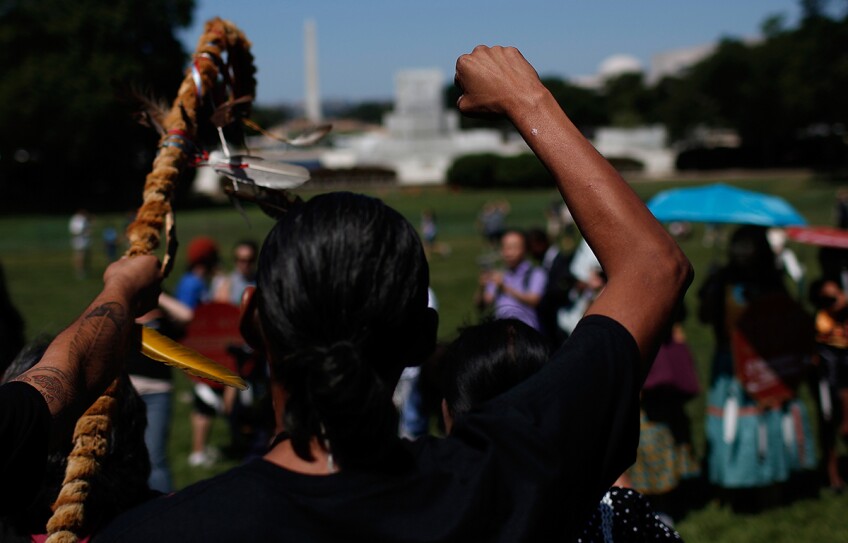Naelyn Pike: Apache Fighter and Sacred Site Protector

Naelyn Pike, Chiricahua Apache, remembers being 5 years old and hearing her grandfather, former tribal council member Wendsler Nosie Sr., speak at an event to protest foreign mining on Oak Flat, an Apache sacred site. Jeers of “Go back to your reservation” stick out in her memory. Now, she’s 21, and ever since she was 13, she’s been testifying to Congress and other leaders to stop Resolution Copper, a foreign-owned mining company, from extracting copper ore from the Apache sacred site in Arizona.
“Hearing this information, you think because you’re young and you’re a woman of color, that no one’s going to hear you,” Pike said. “But what was instilled in me, by … my ancestors, because they fought for their land and they fought for us to stand here and be here today, [was that] I could also fight. It’s not fighting with bows and arrows, and it’s not fighting in that kind of sense, but now it’s fighting with laws and fighting through paperwork and through speaking out, and going to events and testifying and contacting our congressmen and our leaders of our nation, and so that’s what I started to do.”

More Indigenous Youth Activists
Pike was one of the youngest people to ever testify in front of Congress at age 13, when she spoke against mining at Oak Flat. She has continued speaking out and sharing information about Apache Stronghold, the Oak Flat protection organization she leads with her grandfather and mother, Vanessa Nosie, and its mission to keep the sacred area and others safe from extraction. This March, she wrote a testimony for the House Natural Resources Subcommittee for Indigenous Peoples of the United States on “The Irreparable Environmental and Cultural Impacts of the Proposed Resolution Copper Mining Operation.”
For Apache people, Pike explained, land holds spiritual significance as the stage for important religious ceremonies. Pike’s sister had her coming-of-age ceremony at Oak Flat, and Pike’s took place at Mount Graham, another site in danger of desecration, this time, by the University of Arizona trying to install telescopes on the mountain. She and her community have been fighting against exploitation of both sites.
“When corporate companies or the United States government want to take those sacred areas and use them for profit, Apache people … are the first people on the forefront to protect these places,” Pike said. “For us, it’s much more than profit. It’s much more than land. It’s our way of life.”
Apache people were historically nomadic, so the government restricting them to live and practice ceremonies on reservations goes against their way of life, Pike explained.
Protecting Oak Flat is becoming increasingly dire as the land is scheduled to transfer to Resolution Copper next year. Former Arizona Senators John McCain, Jeff Flake and Representatives Ann Kirkpatrick and Paul Gosar handed over the land to the mining company as part of the Southeast Arizona Land Exchange and Conservation Act, which was buried in legislation for military funding. The law allows the transfer of land from the state of Arizona to Resolution Copper, with only brief mentions of “addressing the concerns” and “minimizing adverse effects” on Indigenous people.

“ ... You think because you’re young and you’re a woman of color, that no one’s going to hear you .... But what was instilled in me, by … my ancestors, because they fought for their land and they fought for us to stand here and be here today, [was that] I could also fight. It’s not fighting with bows and arrows ... but now it’s fighting with laws and fighting through paperwork and through speaking out, and going to events and testifying and contacting our congressmen and our leaders of our nation, and so that’s what I started to do.”<br>Naelyn Pike
“It’s another military act on native people. It’s also another act that can potentially become a domino effect and ruin our future,” Pike said.
Pike said Apache religion teaches that Mother Earth is powerful enough to renew herself. However, Earth's difficult recovery from human exploitation could come at the expense of human life. Advocating for environmental issues is also a fight to preserve human existence.
“We as human beings are taking too much,” Pike said. “Too much where she cannot take it anymore. And when everything is gone, she will still be here. The Earth will still be living. But us, as human people, will be gone.”
Advocating for Indigenous land rights is multi-faceted because it focuses on both human rights and environmental protection, Pike said. It also expands outside of the Apache community and even Native communities in general, because government and corporate entities have been exploitingthe land and resources of other people of color and low-income areas as well. The Apaches’ fights for Oak Flat and Mount Graham are just small tiles in a mosaic of systemic issues.
“I think this is one of the crucial reasons why everyone needs to jump on board,” Pike said. “Whether they believe in social justice, whether they believe in climate change and trying to protect the planet, going and being part of Native fights and fighting for these issues will help them to do all of that in one.”
Top Image: Naelyn Pike speaks at the 2016 Bioneers Conference. | Hardy Wilson, Courtesy of Bioneers






